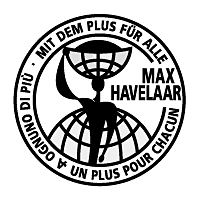 |
| Max Havelaar, the first Fairtrade mark |
York is home to a groundbreaking Fairtrade shop too: Shared Earth was founded in York as one of the first UK retailers to follow in the footsteps of Wereld Winkel in 1986, with a similar range of wares: predominantly craft items and clothing.
One major change in buying habits over the last 45 years was the move towards Fairtrade food as well as crafts: firstly long-life products like tea, coffee and chocolate and then more recently perishable items like bananas. Initially, fairly traded tea and coffee were only available in ethical shops like the Wereld Winkel or via stalls like the one I set up at my church aged 17, because there was otherwise no way for consumers to tell whether food sold in supermarkets or elsewhere was fairly traded.
The next major innovation was also Dutch: "Max Havelaar" was the first ever Fairtrade label, launched in 1988, selling coffee from Mexico. This was initiated by a sharp descent in world coffee prices which meant there was now a serious risk that coffee farmers could be paid less than the coffee actually cost to produce. The name "Max Havelaar" came from a fictional Dutch character who opposed the exploitation of coffee pickers in Dutch colonies (a book published in 1859).
 |
| The new Dutch Fairtrade logo still includes Max Havelaar! |
The new label offered mainstream coffee industry players the opportunity to adopt a standardized system of Fair Trade criteria, and allowed consumers to be confident that products met stringent conditions to ensure justice for poor farmers. The Max Havelaar initiative proved so successful that the UK Fairtrade Foundation was founded in 1992 by a group of charities including Traidcraft, Christian Aid and Oxfam.
The Fairtrade logo has gone through several different designs but is now internationally recognised and widely available in mainstream shops. I was interested to find this week that in the Netherlands, the Fairtrade logo still includes "Max Havelaar" beneath!
The effect has been dramatic: while in 1992 the vast majority of fairly traded products (80%) were handicrafts, last year 80% of a much larger market of Fairtrade products were food items and only one in five were craft items.
See also
- How Fairtrade helps build essential infrastructure
- The need for a new economics
- Is it time for the "un-Fairtrade" logo?
No comments:
Post a Comment